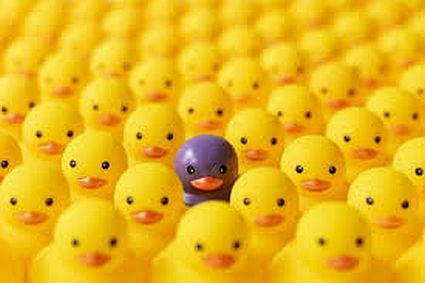I’ve been reading some fascinating work on marketing, brand building, differentiation (Imagine ever learning something from marketers 😉 ) I listened to a fascinating webcast by Mark Ritson about Differentiation, take some time to listen to it.
It prompted me to think a little about differentiation and much more about distinctiveness.
First, a few quick thoughts about differentiation.
We tend to misunderstand and misuse differentiation. We look at how we (our companies/ourproducts) are different from the alternatives. We have endless feature/function comparisons, trying to demonstrate our offerings are different from the competition. Or we compare our customers, “we have these fancy logos…” We spend time with, basically, “mine is bigger/better than theirs,” in comparing alternatives.
We tend to differentiate on what is important to us, rather than what is important to the customer. The only differentiation that matters is that which the customer cares about. So how we differentiate is different for each opportunity and situation.
But let me shift to being Distinctive. In listening to Mark’s webcast it suddenly struck me we don’t pay a lot of attention to being Distinctive. While it may be a fine difference, I think it’s important. (I do look at Distinctiveness a little differently than Mark, but he provoked my thinking on this.)
Distinctiveness is something that makes us stand out. It captures notice. Think, for instance, of companies, brands, or even products that stand out, that are distinctive. Companies like Apple, Nike, Patagonia, Coca-Cola or Pepsi. While, to some degree, their products/brand make them stand out. But it is other, often intangible things, that make them distinctive. It’s their people, what they stand for, their approaches, their values, how they innovate.
Again, they stand out not for what they sell, but for everything they do.
While much of the writing on distinctiveness seems to be more marketing and brand oriented, we have to look at distinctiveness much more broadly. For example, how we engage customers, how we create meaning/engagement within our own organizations, the experiences we create for our customers–through the lifecycle of the relationship with us. Distinctive organizations tend to be the thought leaders or trend setters within their markets and industries. They aren’t necessarily the biggest, but their competitors pay attention to what they are doing, why they are doing it and what it might mean for them. Some years ago, I was consulting a technology company. They were introducing a new technology into the banking industry. We chose a certain mid sized regional bank to pilot the technology. We chose them because they were distinctive in their approach to retail banking. When they started talking about what they were doing with us, their competitors around the world, including the mega banks paid attention. We were deluged with queries, “What are they doing, what might it mean to us?”
Differentiation tends to look at product/solution capability comparisons. There may be a lot of similarity and overlap, we try to differentiate based on capability important to the customer, hoping that collectively our differentiators are greater than the alternatives. But distinctiveness becomes something that becomes the benchmark of all comparisons. Distinctive organizations become the companies that everyone compares themselves to. Distinctiveness tends to attract customers and others to us, paying attention to who they are, what they stand for, how they get things done. Distinctive organizations become the “standard” to which others compare themselves and aspire to. They set a direction, not only in their markets, but beyond.
In some sense it’s reminiscent of the old EF Hutton commercials, “When EF Hutton talks, everyone listens….”
Differentiation is important, but being Distinctive sets you apart from everyone else.

Leave a Reply